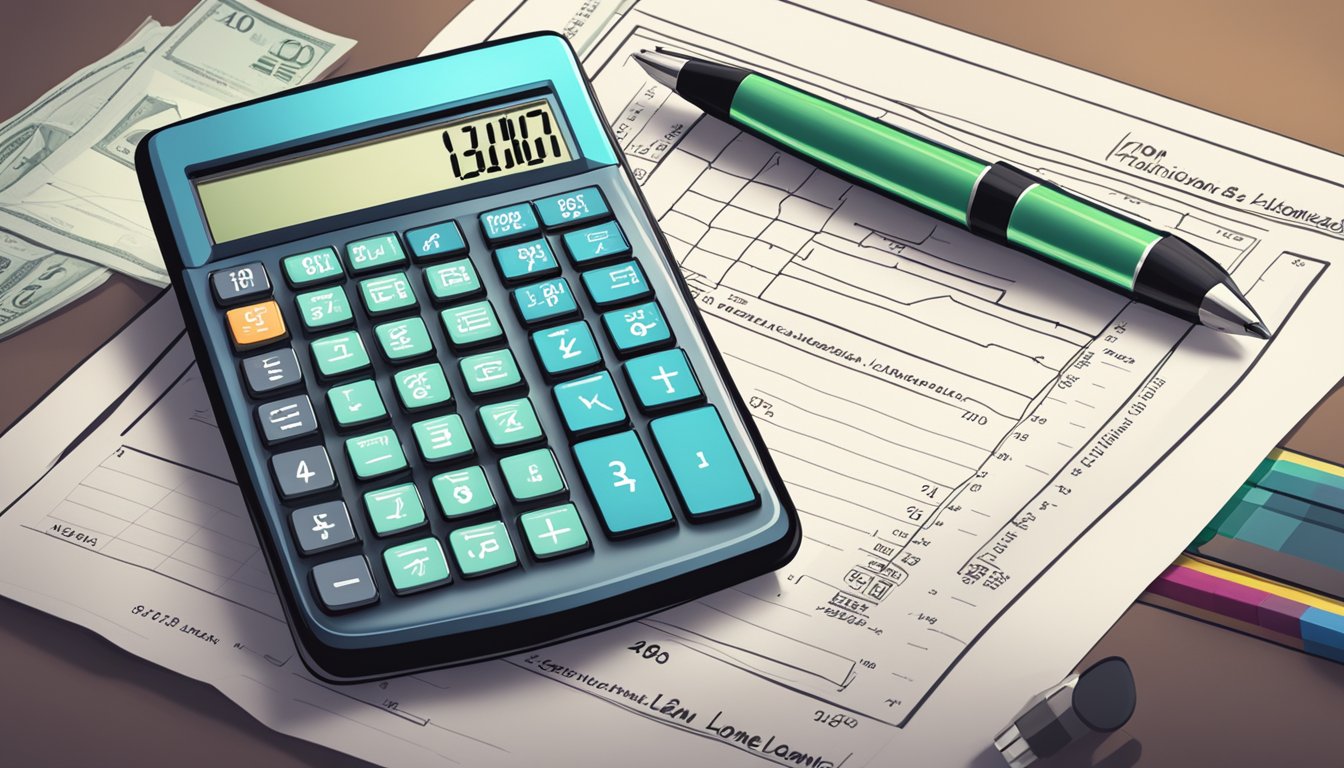Introduction:

If you are planning to buy a property in Singapore, you might be wondering how much you can borrow for a home loan. Understanding your borrowing limits is crucial as it can help you determine what kind of property you can afford and what your monthly repayments will be. In this article, we will guide you through the process of calculating your borrowing limits and help you understand the home loan application process in Singapore.
Understanding Home Loans in Singapore:
Before we dive into the details of calculating your borrowing limits, it’s important to understand how home loans work in Singapore. In Singapore, there are two types of home loans: bank loans and HDB loans. Bank loans are offered by commercial banks, while HDB loans are offered by the Housing and Development Board (HDB). The maximum loan amount you can borrow depends on the type of loan you choose and your eligibility criteria.
Eligibility and Borrowing Limits:
To be eligible for a home loan in Singapore, you must be a Singapore citizen or permanent resident. You must also be at least 21 years old and have a stable income. The maximum loan amount you can borrow depends on various factors such as your income, age, credit score, and the type of property you want to buy. Generally, banks in Singapore offer home loans of up to 75% of the property value, while HDB loans offer up to 90% of the property value.
Key Takeaways
- Understanding the home loan application process is crucial when buying a property in Singapore.
- Eligibility criteria such as income, age, and credit score determine the maximum loan amount you can borrow.
- The maximum loan amount you can borrow depends on the type of loan you choose and the value of the property you want to buy.
Understanding Home Loans in Singapore

If you are planning to buy a house in Singapore, you will need to take out a home loan. A home loan, also known as a mortgage, is a loan that you take out to buy a property. It is a long-term commitment that can last for 20 to 30 years, and it is important to understand the different types of home loans available and the loan-to-value (LTV) limit.
Types of Home Loans
There are two main types of home loans in Singapore: HDB loans and bank loans. HDB loans are offered by the Housing and Development Board (HDB) for the purchase of HDB flats, while bank loans are offered by commercial banks for the purchase of private properties.
HDB loans have a fixed interest rate, which is currently at 2.6% per annum. The maximum loan amount is 90% of the purchase price or valuation of the flat, whichever is lower. The loan tenure can be up to 25 years, or up to the age of 65, whichever is shorter.
Bank loans, on the other hand, have a variable interest rate that is pegged to the Singapore Interbank Offered Rate (SIBOR) or the Swap Offer Rate (SOR). The maximum loan amount is 75% of the purchase price or valuation of the property, whichever is lower. The loan tenure can be up to 35 years, or up to the age of 75, whichever is shorter.
Loan-to-Value (LTV) Limit
The loan-to-value (LTV) ratio is the amount of money you can borrow as a percentage of the property’s value or purchase price, whichever is lower. In Singapore, there is an upper LTV limit of 75% for bank loans and 90% for HDB loans.
Your risk profile and borrowing history will always affect the lower LTV limit you are offered. This means that if you have a good credit score and a stable income, you may be able to borrow more than the LTV limit. However, if you have a poor credit score or unstable income, you may be offered a lower LTV limit.
It is important to note that the LTV ratio is not guaranteed. HDBs and banks are not required to let you borrow the maximum LTV. Therefore, it is important to do your research and shop around for the best home loan that suits your needs and budget.
Overall, understanding home loans in Singapore is crucial if you are planning to buy a property. By knowing the types of home loans available and the loan-to-value (LTV) limit, you can make an informed decision and find the best home loan for your needs.
Eligibility and Borrowing Limits

When it comes to borrowing for a home loan in Singapore, there are a few eligibility requirements you need to meet. These requirements are in place to ensure that you can afford the loan you are taking out and that you are not putting yourself at financial risk.
Total Debt Servicing Ratio (TDSR) and Mortgage Servicing Ratio (MSR)
One of the most important eligibility requirements for a home loan in Singapore is the Total Debt Servicing Ratio (TDSR) and Mortgage Servicing Ratio (MSR). The TDSR is the maximum percentage of your gross monthly income that can be used to pay off all your financial commitments, including your home loan. The MSR is the maximum percentage of your gross monthly income that can be used to pay off your housing loan.
To be eligible for a home loan in Singapore, your TDSR must be 60% or less, and your MSR must be 30% or less if you are buying an HDB flat. If you are buying a private property, your MSR must be 35% or less.
Assessing Your Financial Health
Before you apply for a home loan in Singapore, it is important to assess your financial health. This will help you determine how much you can afford to borrow and what your eligibility requirements are.
To assess your financial health, you should take into account your gross monthly income, your financial commitments, your credit history, and your credit score. You should also consider your age, as this can affect your eligibility for a home loan.
It is important to note that there are borrowing limits in place in Singapore. The maximum Loan-to-Value (LTV) ratio for bank loans is 75% for private properties and 90% for HDB flats. The LTV ratio is the maximum percentage of the property’s value that you can borrow.
In conclusion, to be eligible for a home loan in Singapore, you must meet certain eligibility requirements, including the TDSR and MSR. It is also important to assess your financial health and consider the borrowing limits in place. By doing so, you can ensure that you borrow responsibly and avoid putting yourself at financial risk.
Calculating Your Loan Amount

When it comes to buying a home in Singapore, one of the most important considerations is how much you can borrow for a home loan. In order to determine your maximum loan amount, you’ll need to take into account a number of factors, including your income, the property value, and the interest rate on your loan.
Incorporating Income and Property Value
One of the key factors that will impact your loan amount is your income. In general, lenders will look at your income to determine how much you can afford to borrow. They will also consider the value of the property you’re looking to purchase. This is because the value of the property will impact the amount of collateral that the lender has in the event that you default on your loan.
To calculate your home loan amount, you’ll need to take into account your income and the value of the property you’re looking to purchase. This will give you an idea of how much you can afford to borrow. You can use a home loan calculator to help you determine your maximum loan amount.
Impact of Interest Rates on Borrowing
Another important factor to consider when calculating your loan amount is the interest rate on your loan. The interest rate will impact the amount of your monthly payments, which will in turn impact how much you can afford to borrow.
When interest rates are low, you may be able to afford a larger loan amount. However, when interest rates are high, you may need to adjust your expectations and look for a more affordable property.
It’s important to keep in mind that interest rates can fluctuate over time. This means that your monthly payments may also fluctuate, which can impact your ability to repay your loan.
Overall, when calculating your loan amount, it’s important to take into account a number of factors, including your income, the value of the property you’re looking to purchase, and the interest rate on your loan. By carefully considering these factors, you can determine how much you can afford to borrow and find the home loan that’s right for you.
The Home Loan Application Process

Applying for a home loan can be a daunting task, but it doesn’t have to be. With the right information, you can make informed decisions and choose the right loan for you. Here’s what you need to know about the home loan application process.
Choosing the Right Loan for You
Before you start the application process, it’s important to choose the right loan for you. There are different loan types available to suit different needs, such as fixed-rate, variable-rate, and interest-only loans. You should also consider the financial institution you want to borrow from, such as banks or CPF.
When choosing a loan, it’s important to consider your eligibility criteria, such as your income, credit score, and debt-to-income ratio. You should also consider the type of property you want to purchase, whether it’s an HDB flat or a private property.
Required Documentation
Once you have chosen a loan, you will need to provide the required documentation to apply. This may include your income statements, bank statements, and identification documents. You may also need to provide additional documentation depending on the loan type and financial institution.
It’s important to ensure that all your documentation is accurate and up-to-date to avoid delays in the application process. You should also be prepared to answer any questions the financial institution may have about your application.
With these tips, you can confidently apply for a home loan and choose the right loan for you. Remember to do your research, consider your eligibility criteria, and provide accurate documentation to increase your chances of approval.
Additional Costs and Considerations

When it comes to borrowing for a home loan in Singapore, there are a few additional costs and considerations to keep in mind. These can include downpayment and fees, insurance, and other financial safeguards.
Understanding Downpayment and Fees
When purchasing a home in Singapore, you will typically need to make a downpayment of at least 5% of the purchase price. However, keep in mind that the actual downpayment required may be higher, depending on factors such as the type of property and your creditworthiness.
In addition to the downpayment, there are also various fees and charges associated with purchasing a home in Singapore. These can include legal fees, valuation fees, and buyer stamp duty, among others. Be sure to factor these costs into your budget when determining how much you can afford to borrow.
Insurance and Other Financial Safeguards
When taking out a home loan in Singapore, it’s important to consider insurance and other financial safeguards to protect yourself in case of unforeseen circumstances. This can include mortgage insurance, which can help cover your mortgage payments in the event of job loss or disability.
Other financial safeguards to consider may include life insurance or critical illness insurance, which can help ensure that your family is financially protected in case of unexpected events. Be sure to speak with a financial advisor to determine what types of insurance and other financial safeguards may be appropriate for your specific situation.
Overall, when borrowing for a home loan in Singapore, it’s important to carefully consider all of the additional costs and considerations involved. By doing so, you can ensure that you are able to borrow the amount you need while also protecting yourself and your family from potential financial risks.
Frequently Asked Questions

What’s the highest amount I might secure for a mortgage in Singapore?
The maximum amount you can borrow for a mortgage in Singapore is dependent on your credit score, income, and the value of the property you’re purchasing. Generally, banks offer up to 75% of the property’s value for bank loans and up to 90% for HDB loans.
Could you tell me the peak loan value I can snag for a condo through a bank?
The maximum loan amount you can secure for a condo through a bank depends on the property’s value and your financial profile. Banks usually offer up to 75% of the property’s value for bank loans, and the loan amount can go up to millions of dollars for high-value properties.
What’s the minimum sum I can take out for a home loan here in Singapore?
The minimum amount you can take out for a home loan in Singapore varies across banks. However, most banks offer a minimum loan amount of $100,000.
Could you calculate the maximum bank loan I’m eligible for when buying property?
The maximum bank loan you’re eligible for when buying property depends on several factors, including your credit score, income, and the property’s market value. Typically, banks offer up to 75% of the property’s value for bank loans.
How does one determine the cap on borrowing for an HDB flat loan?
The cap on borrowing for an HDB flat loan is determined by the HDB loan rules and regulations. HDB loans are available for up to 90% of the property’s value.
What factors into the calculation of my potential mortgage borrowing limit?
Several factors determine your potential mortgage borrowing limit, including your credit score, income, employment status, age, and the property’s value. Banks use these factors to calculate your Loan-to-Value (LTV) ratio, which determines the maximum loan amount you can secure.




